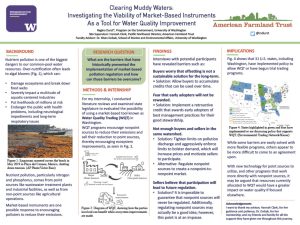Clearing Muddy Waters: Investigating The Viability Of Market-Based Instruments As A Tool For Water Quality Improvement
Water Quality Trading (WQT) programs are market-based instruments that have the potential to greatly improve the health of many of our common-pool water resources. Although nutrient pollution negatively affects the environment, public health, and a multitude of aquatic industries, many of the nonpoint sources that discharge nutrient pollution remain unregulated in the United States. By encouraging WQT programs, where regulated point sources (PS) pay unregulated nonpoint sources (NPS) to offset their pollution, it may be possible to reduce the total environmental impact on our waters. The purpose of this study was to discover if a market-based trading program would be viable in Washington. To accomplish this task, I examined state legislature to see whether a program could be supported without further changes to local policy. I also conducted a literature review of case studies to understand the barriers that trading programs have historically faced and compared the proposed model with past successful markets. Findings show that, while Washington policies allow trading programs, it is unlikely that many trades would occur due to a number of concerns on both supply (NPS) and demand (PS) sides. Concerns were primarily focused on high transaction costs, reluctance to trade with unfamiliar parties, and the perception of some farmers that participating would lead to future regulation or greater public scrutiny. I concluded that, in its current iteration, WQT is unlikely to find great success in Washington State, and that it may be fruitful to pursue programs that work more directly with farmers and landowners instead.
